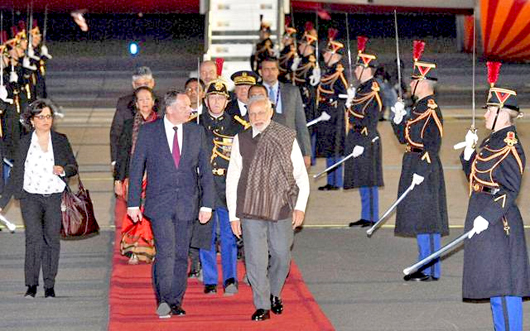Paris, Apr 10: Prime Minister Narendra Modi arrived in Paris today on the first leg of his three nation tour. He was received by French Minister of State for Sports Thierry Braillard at the Orly International Airport here. Indian Ambassador to France, Arun Singh, was present at the airport to welcome the Prime Minister.
The members of the Indian community were also present. Earlier on Thursday, Prime Minister Modi left for his nine-day visit to France, Germany and Canada, with the objective of holding bilateral talks as well as people to people contacts with all three key global economic powerhouses. "Prime Minister Modi will be travelling to France, Germany and Canada. A common theme of these destinations is that all of them are G7 countries: they are industrialised democracies. We have a considerable economic interest in partnering with these countries which is very relevant to our industrial programmes. We have a large political convergence with them," Foreign Secretary S. Jaishankar had told the media.
Jaishankar further elaborated on the Prime Minister's schedule in France. "Prime Minister Modi will arrive on April 9 in Paris and his day begins on April 10 with a ceremonial welcome in the morning. He has two back-to-back round tables: one with French CEOs discussing infrastructure as a theme, and the second will deal with defence technology as a theme," he said. "Infrastructure is a high priority for the government and we believe that a lot of French companies have expertise in the sector. In defence, our relationship with France has had defence, space and nuclear as three important components. French companies are very experienced and we hope that they participate in the Make in India initiative in the defence sector," he added.
Jaishankar further said that Prime Minister Modi will meet the French President after speaking before the UNESCO. "The Prime Minister will be speaking at UNESCO, and then will attend a lunch hosted by the National Assembly president. Later, he will meet French President Hollande and will hold a tete-a-tete before holding bilateral talks. The two leaders will receive a report of Indo-French CEOs forum. Then they will take a boat ride on the Seine, before President Hollande hosts a banquet for the Prime Minister," he said.
"On April 11, the Prime Minister will travel to Toulouse, where he will tour the Airbus facility, before visiting French space company CNES before meeting the head of the local government. After that, he shall travel to Lille, where he will visit a World War I memorial, to bring out the role of Indian soldiers in the war. Later, he returns to Paris for a community reception before meeting former France president Sarkozy," he added.
Prime Minister Modi will reach the German city of Hannover on Sunday on the second leg of his visit. He will reach Canadian capital Ottawa on Tuesday on the final leg of his visit.






Comments
Add new comment